Overview
Navigating the application process for Total Disability based on Individual Unemployability (TDIU) benefits can feel overwhelming. We understand that many veterans face unique challenges during this journey. This article offers essential tips to help you successfully manage this process.
- Thorough documentation is crucial.
- By understanding the eligibility criteria and avoiding common mistakes, you can significantly enhance your chances of a successful claim.
- Remember, you're not alone in this; many have walked this path before you, and their experiences can guide you.
We encourage you to utilize the available resources and seek support. Real-world examples illustrate how others have successfully navigated this process, providing hope and inspiration. Together, we can work towards securing the benefits you deserve.
Introduction
Navigating the complexities of Total Disability based on Individual Unemployability (TDIU) benefits can feel overwhelming for veterans seeking the support they deserve. We understand that the stakes are high, and the process often presents numerous challenges. It’s essential to grasp the vital steps and requirements necessary to secure these important benefits. In this article, we offer seven indispensable tips designed to simplify the application process and empower you to advocate effectively for your rights.
How can you ensure that you avoid common pitfalls and maximize your chances of approval in this ever-evolving landscape of eligibility criteria? You are not alone in this journey; we're here to help.
Turnout: Streamlining TDIU Benefit Applications for Veterans
Turnout is transforming the application process for TDIU benefits, harnessing the power of AI technology to make it easier for you. We understand that navigating claims can be overwhelming, especially for former service members. That’s why our innovative platform is designed to simplify these complexities, allowing you to approach your application with confidence.
With tailored guidance, Turnout helps you grasp the necessary documentation and eligibility criteria, significantly enhancing the efficiency of your journey. Importantly, we want to clarify that Turnout is not a law firm and does not provide legal advice, ensuring transparency in everything we do.
Veterans have shared their experiences with us, highlighting how our streamlined approach alleviates the stress often associated with TDIU benefits applications. The incorporation of AI not only speeds up the application process but also ensures that you receive the support you need to secure your entitlements.
Successful applications of AI in this context have led to a noticeable decrease in processing times. This means you can focus on your recovery and well-being, rather than getting bogged down by bureaucratic hurdles. As the Department of Veterans Affairs continues to explore advancements in AI, Turnout remains at the forefront, dedicated to enhancing the experience for those who have served our country.
Additionally, we maintain a transparent fee structure for our services, which helps you accurately complete the necessary forms without any affiliation with government agencies. Remember, you are not alone in this journey; we’re here to help.
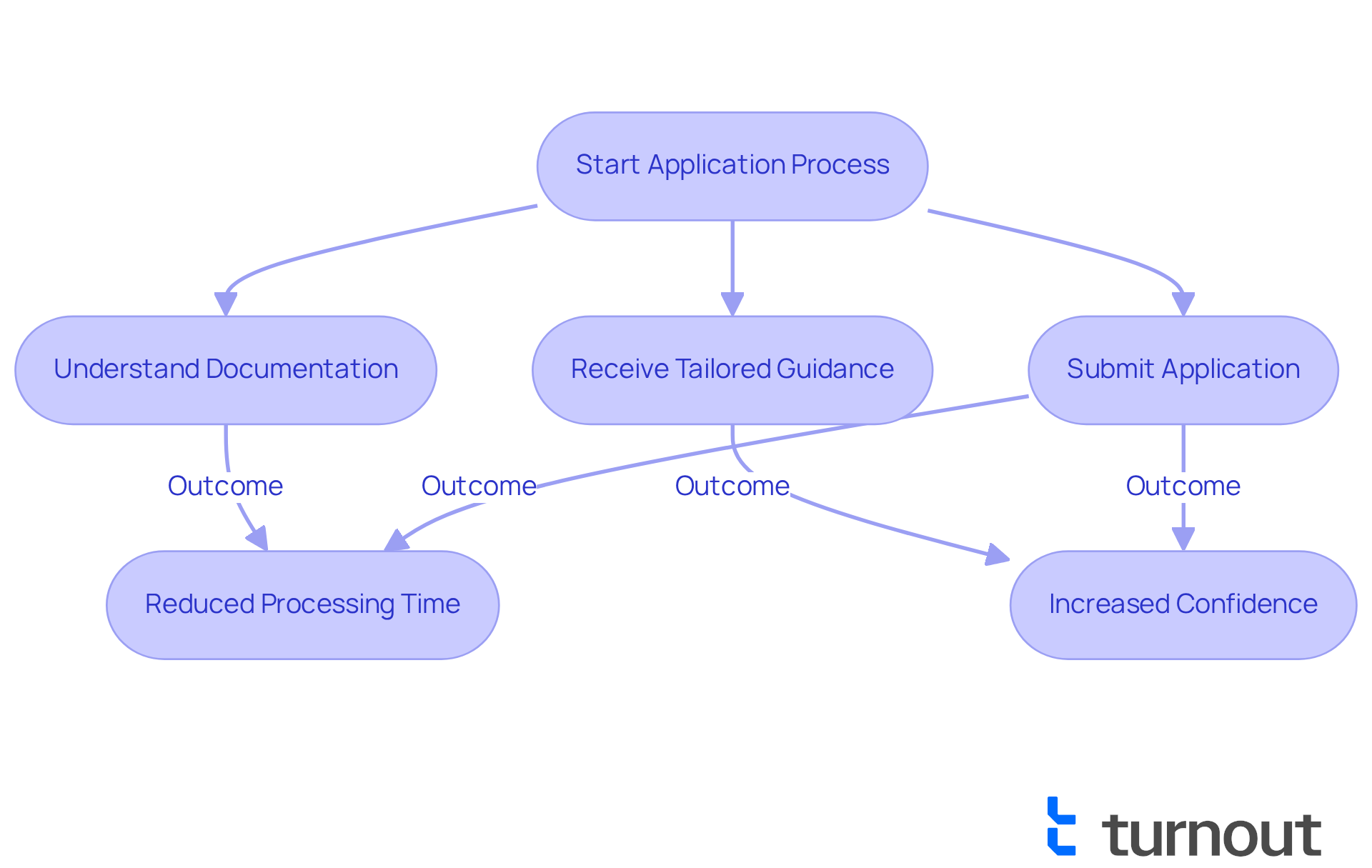
TDIU Eligibility Criteria: Key Requirements for Veterans
Service members must meet specific eligibility criteria to qualify for TDIU benefits. We understand that navigating this process can be challenging. Typically, you must have at least one service-connected condition rated at 60% or higher, or two or more service-connected conditions totaling 70%, with one condition rated at least 40%. Additionally, former service members need to demonstrate that their disabilities prevent them from maintaining significantly profitable employment.
Recent changes to disability compensation regulations, anticipated in 2025, aim to streamline the application process and enhance accessibility for former service members. This includes the expected growth of Presumptive Conditions and new age guidelines focusing on individuals with limited employment opportunities due to age, which may influence eligibility criteria.
Statistics show that a substantial percentage of former service members meet the eligibility requirements for TDIU benefits. For instance, as of 2025, CCK Law has assisted nearly 30,000 service members. This highlights the importance of understanding the intricacies of the application process. Real-world examples, like Kent's experience of obtaining a 100% impairment award after 45 years of rejections, demonstrate that positive outcomes are possible with the right support.
As the landscape of support for former service members evolves, staying informed about these changes is crucial for those relying on disability compensation. Remember, you are not alone in this journey. Consulting knowledgeable professionals and keeping an eye on updates from reliable sources can provide valuable guidance as you navigate the complexities of the VA system.
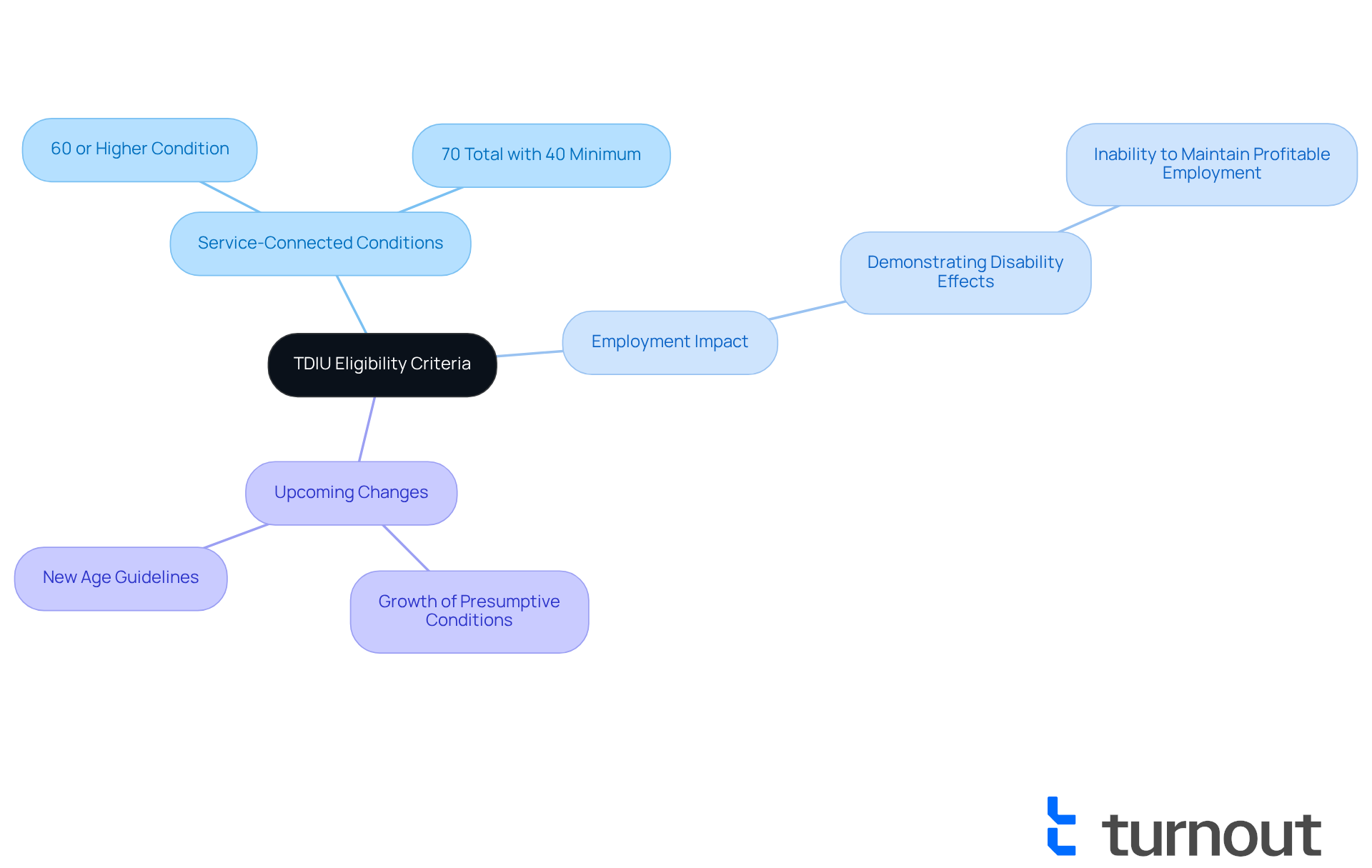
Comprehensive Overview of TDIU Benefits Available to Veterans
This assistance provides ex-service members with compensation at the 100% disability rate, even if their total disability ratings do not reach that threshold. As we look ahead to 2025, individuals receiving TDIU benefits can expect monthly payments of $3,831.30, along with additional compensation for dependents. Beyond financial support, those qualifying for total disability based on individual unemployability receive TDIU benefits that provide access to extensive healthcare services, significantly reducing medical costs. Moreover, former service members may also be eligible for vocational rehabilitation and education assistance, easing their transition to civilian life.
The significance of TDIU benefits based on individual unemployability is highlighted by the experiences of former service members like Shirley T., who expressed deep gratitude for the assistance she received during her lengthy appeals process, ultimately securing over $104,000 in support. Similarly, James D., a veteran from Vietnam, shared how the program helped him achieve a 100% impairment rating after years of struggle. His story highlights the transformative impact this program can have on the lives of those who have served.
In addition to financial support, this program serves as a vital safety net. It ensures that veterans unable to maintain meaningful employment due to service-related impairments receive TDIU benefits for the assistance they need. This includes access to various programs designed to enhance their quality of life and foster independence.
We understand that navigating these processes can be overwhelming. Rest assured, you are not alone in this journey. We’re here to help you every step of the way.
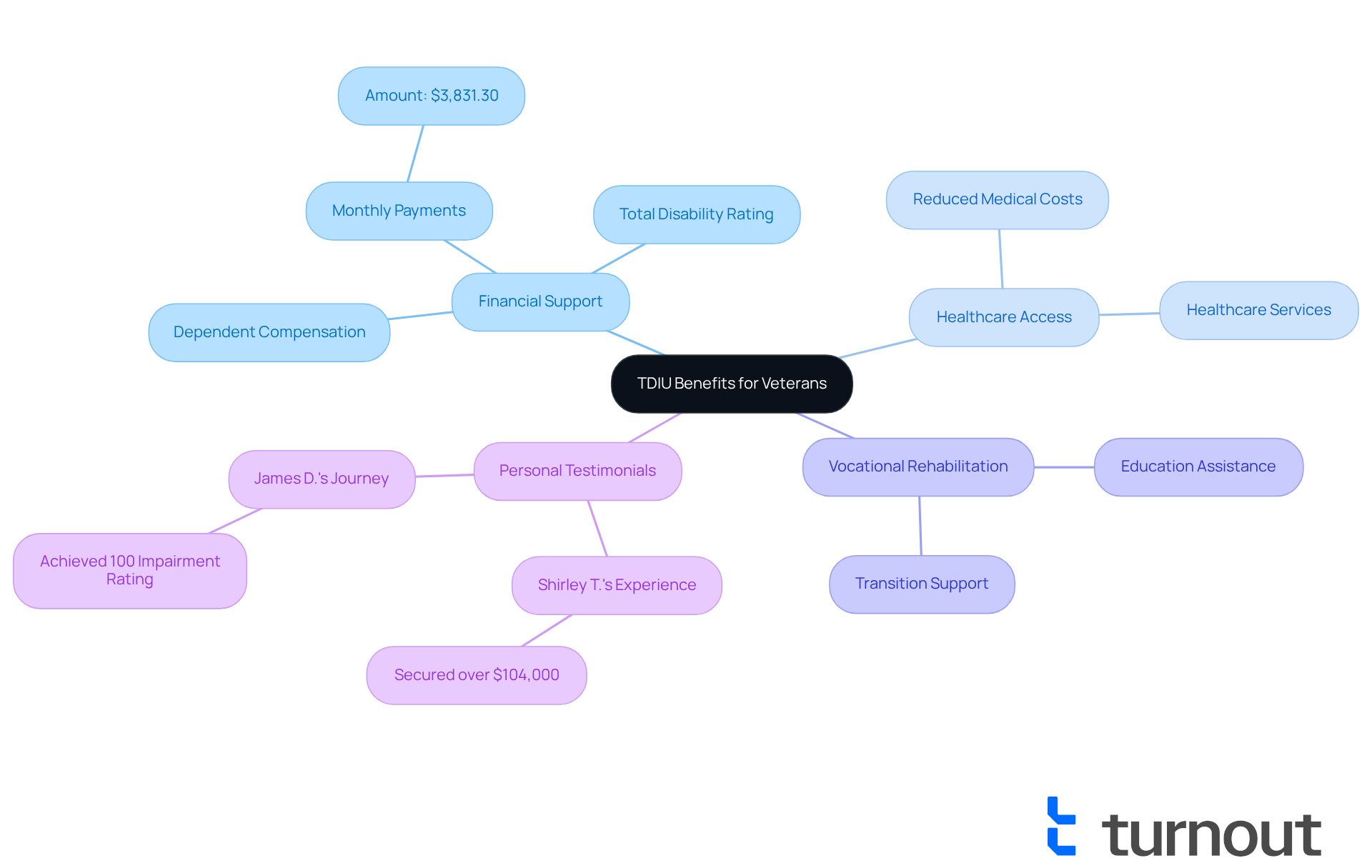
Step-by-Step Guide to Applying for TDIU Benefits
Applying for TDIU benefits can feel overwhelming, but taking it step by step can help ensure a successful claim for TDIU benefits. Here’s a compassionate guide to help you through the process:
-
Gather Necessary Documentation: Start by collecting your medical records that show your service-connected disabilities, along with a detailed employment history for the last five years. This information is essential in establishing your eligibility.
-
Complete VA Form 21-8940: This form serves as your application for increased compensation based on unemployability. It’s important to fill out all sections accurately, as this will significantly impact how your claim is evaluated.
-
Submit Your Application: Once you’ve completed VA Form 21-8940, send it along with all supporting documents to the VA. You can submit your application online, by mail, or in person at your local VA office. If you choose to mail it, the address is: Department of Veterans Affairs Claims Intake Center, PO Box 4444, Janesville, WI 53547-4444.
-
Attend Required Examinations: Be prepared to attend any medical examinations or interviews that the VA may require to assess your condition further. We understand that this can be a daunting step, but it’s part of ensuring you receive the benefits you deserve.
-
Monitor Your Claim Status: After submission, keep track of your claim's progress. It’s common to feel anxious during this time, so respond promptly to any requests for additional information to avoid delays.
Veterans have shared positive experiences regarding the application process. One individual noted, "Having someone knowledgeable by your side can be a big plus," highlighting the importance of support during this journey. In 2023, nearly 370,000 former service members obtained disability compensation, showing a growing recognition of the need for these crucial supports. By following these steps and ensuring comprehensive documentation, you can enhance your chances of a successful application for TDIU benefits.
Additionally, understanding the effective date of disability compensation is vital for establishing back pay remuneration, as it typically aligns with the date of submitting Form 21-8940. Remember, thorough documentation can significantly improve approval rates. You are not alone in this journey; we’re here to help you navigate the process with confidence.
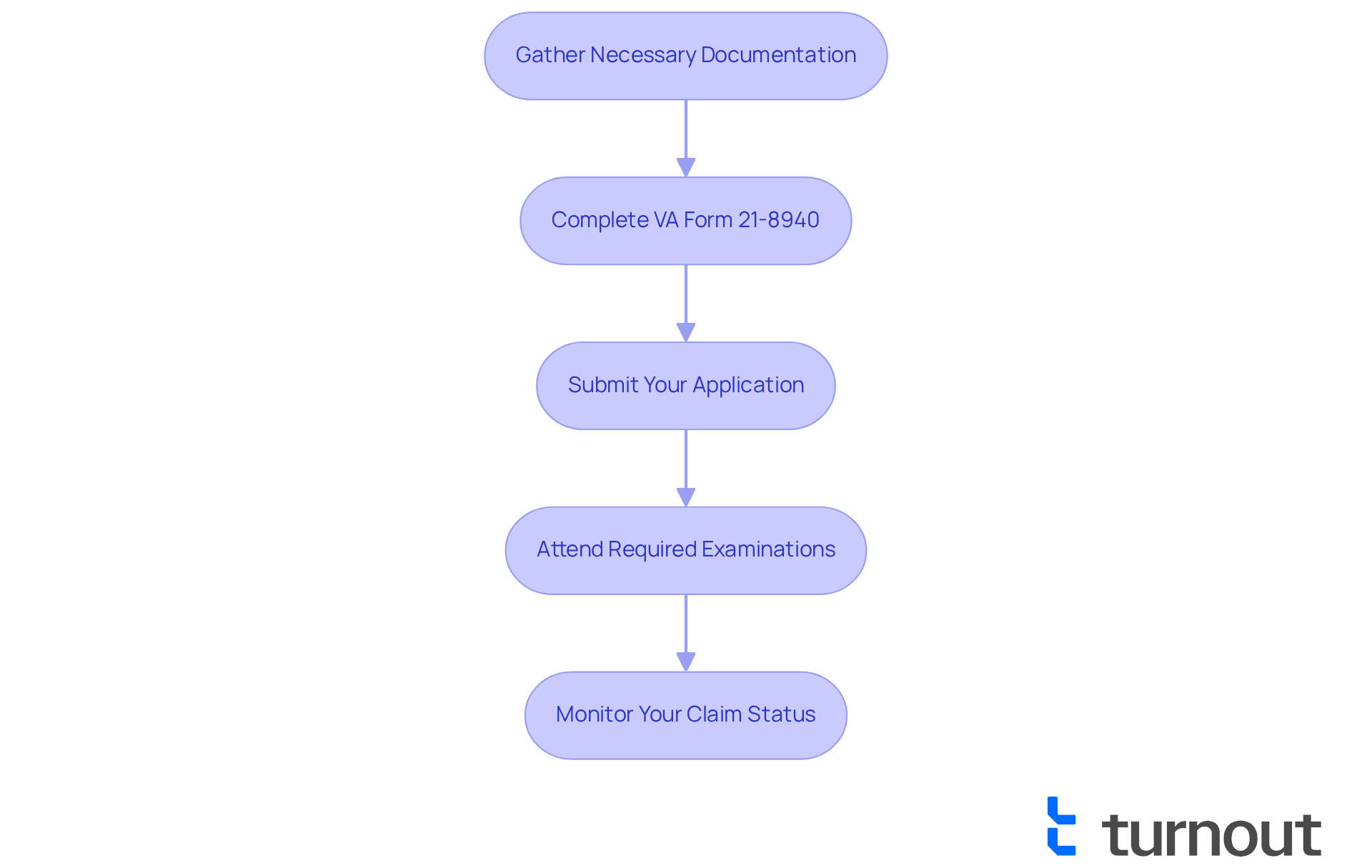
Interplay Between TDIU and Other Disability Benefits: What Veterans Need to Know
Veterans receiving assistance often face unique challenges, and it's important to know that you may also be eligible for additional compensation for impairments, including Social Security Insurance (SSDI). While one program offers compensation at the 100% impairment rate, SSDI has its own eligibility criteria and requires a separate application process. We understand that income restrictions linked to Total Disability based on Individual Unemployability can impact your SSDI payments; exceeding certain limits could jeopardize your eligibility.
It's reassuring to know that former service members can still obtain total disability benefits even if their overall disability rating is below 100%. This means you can optimize your financial assistance. Many veterans successfully manage both TDIU benefits and SSDI, utilizing their resources to enhance their financial security.
Comprehending these interactions is essential for navigating your entitlements effectively. You're not alone in this journey. To maximize your benefits, consider utilizing services like those offered by Turnout. They simplify access to government support and provide expert guidance through trained non-legal advocates, ensuring you can manage your compensation without the need for legal representation. Remember, we're here to help you every step of the way.
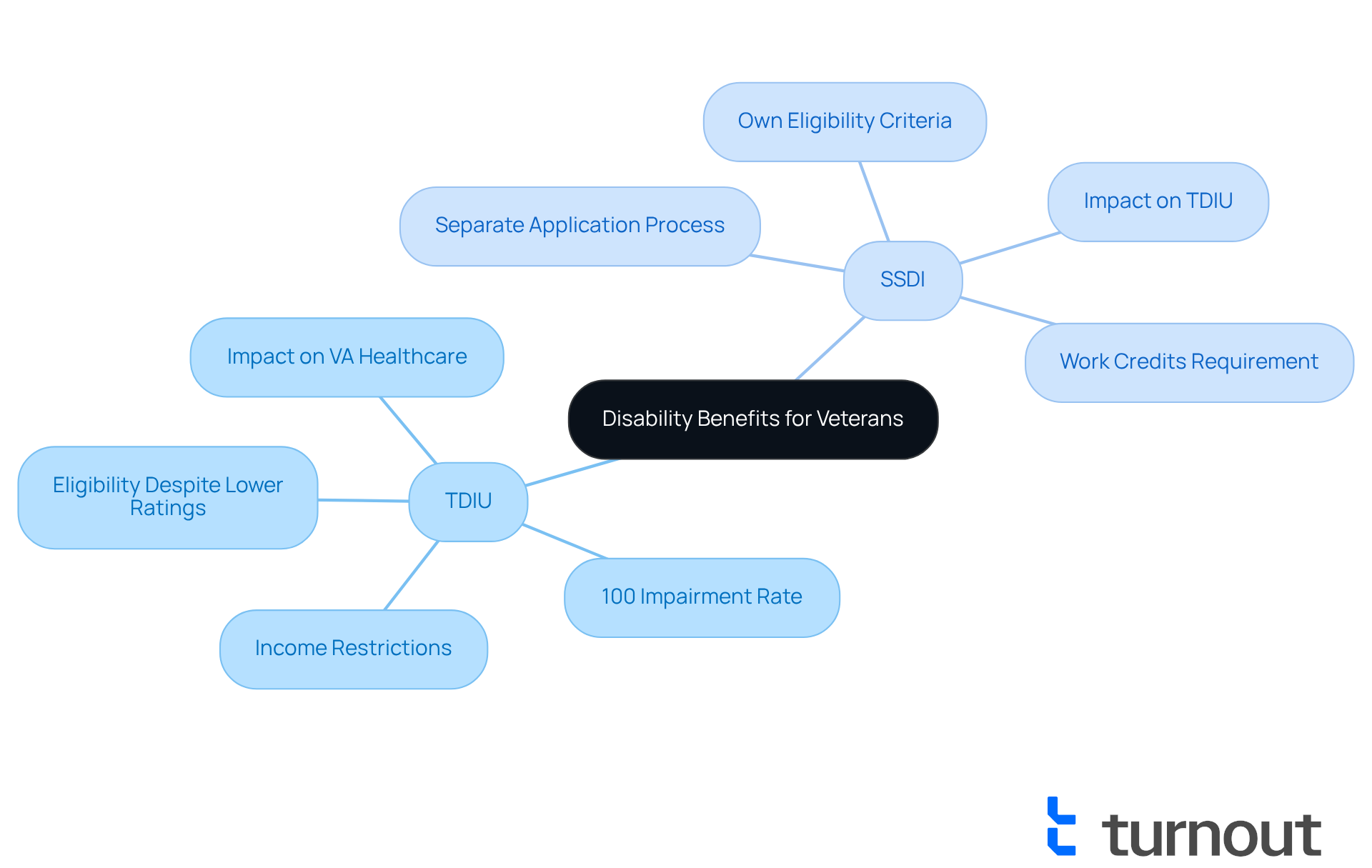
Common Mistakes to Avoid When Applying for TDIU Benefits
When applying for TDIU benefits, we understand that veterans face numerous challenges, and it's important to be aware of common pitfalls that can jeopardize your claims:
-
Insufficient Medical Documentation: It’s common to overlook the need for comprehensive medical records that clearly illustrate how disabilities impact employment. Detailed reports from healthcare providers are essential to substantiate your claims. Remember, insufficient documentation is a leading cause of denials for claims related to TDIU benefits.
-
Inaccurate Completion of VA Form 21-8940: Omitting necessary information or not filling out this form correctly can lead to automatic denials. This form is crucial for outlining your work history and limitations. Ensure that all necessary information is included to avoid setbacks.
-
Missing Deadlines: We know that life can get busy, but ignoring deadlines for submitting applications and supporting documents can result in delays or outright denials. Timely submission is vital for maintaining eligibility, as the VA carefully reviews all claims.
-
Neglecting Personal Statements: Underestimating the importance of personal statements from healthcare providers regarding your ability to work can weaken your claim. These statements offer essential insights into your functional limitations.
By steering clear of these errors, you can greatly enhance your opportunities for obtaining TDIU benefits. You're not alone in this journey; many veterans have successfully showcased their challenges due to service-related conditions. One veteran managed to obtain benefits by supplying detailed documentation and personal accounts, highlighting the significance of a thorough application. We’re here to help you navigate this process and ensure you receive the support you need during difficult times.
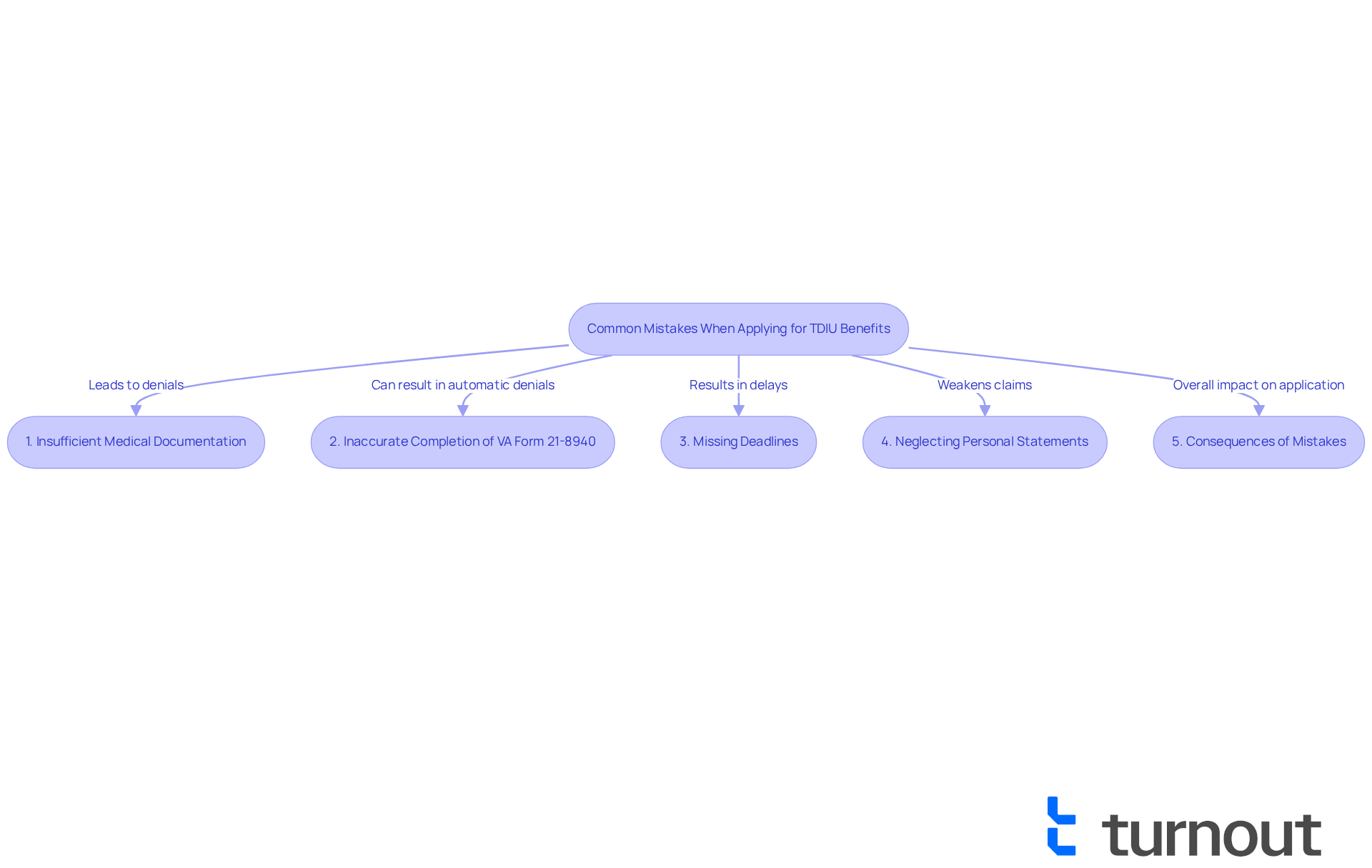
The Role of Medical Documentation in TDIU Claims
Medical documentation is essential for veterans seeking TDIU benefits for their claims. We understand that navigating this process can be overwhelming, and it’s crucial to submit comprehensive medical documentation that details your service-related impairments and their impact on your ability to work. This includes your treatment history, diagnoses, and any relevant test results. Clear statements from your healthcare providers about your limitations and how your disabilities affect your employment are vital in strengthening your claim for TDIU benefits.
It's common to face challenges in gathering this information. Recent studies indicate that the average number of medical records submitted for disability claims often exceeds ten documents, highlighting the importance of thoroughness. Essential records should include:
- Detailed medical evaluations that outline your functional limitations
- Any relevant assessments of your vocational abilities
Moreover, the VA has updated forms to make the documentation process smoother for former service members. Remember, mental health conditions are increasingly recognized in total disability evaluations, which can further support your claim for TDIU benefits. Additionally, providing a complete work history is important, as it helps evaluate potential job opportunities based on your previous experience and skills.
By offering a strong assortment of medical proof, you can significantly enhance the strength of your disability application. We’re here to help you ensure that your claims are well-supported and more likely to succeed. You are not alone in this journey.
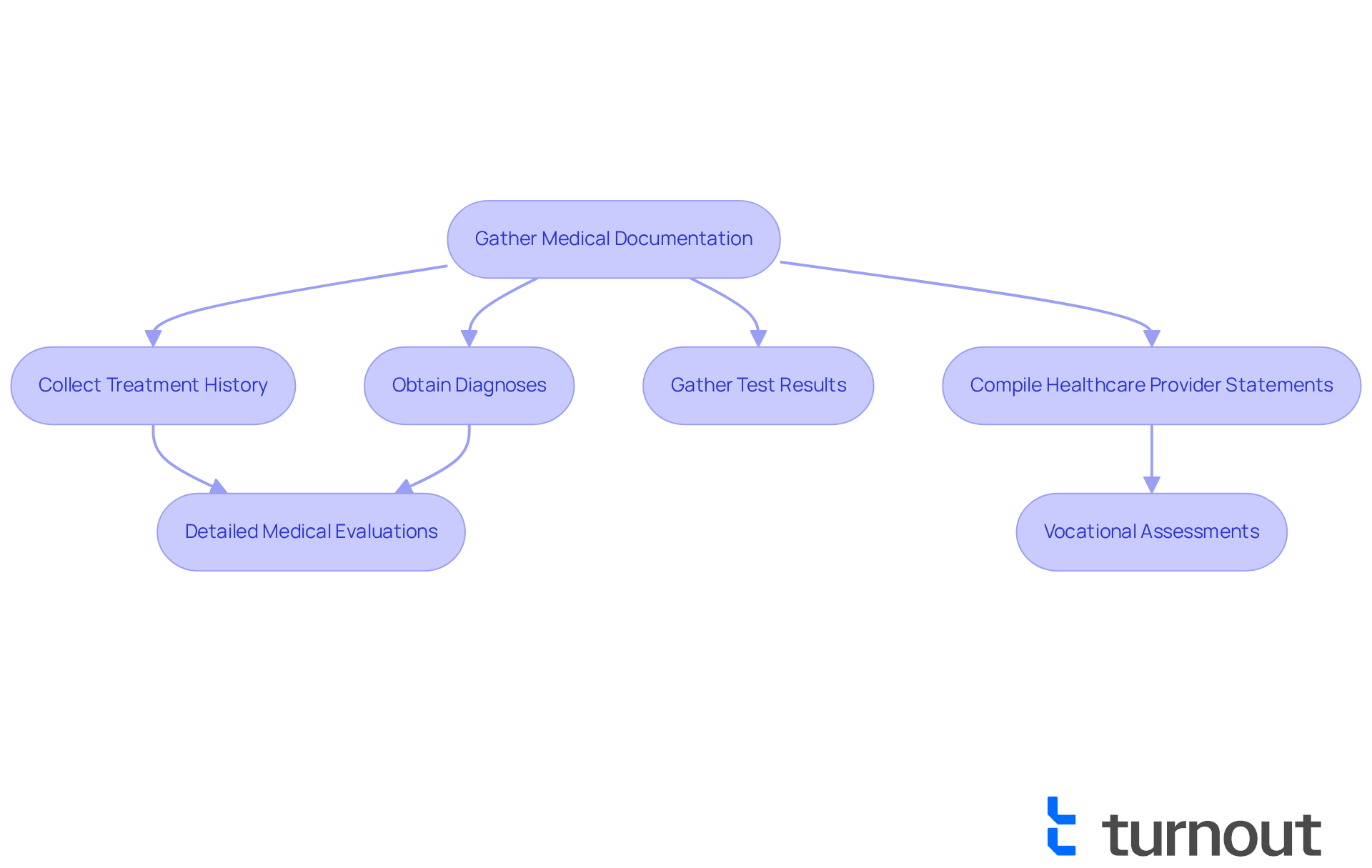
Impact of TDIU Benefits on Family and Dependent Support
The TDIU benefits extend far beyond monetary aid for veterans; they also provide crucial support to their families. Veterans receiving TDIU benefits based on Individual Unemployability may qualify for additional compensation for their dependents, including spouses and children. This added financial support can significantly enhance a family's stability by allowing access to TDIU benefits and other essential resources and services.
For instance, TDIU benefits enable recipients to receive increased monthly compensation based on the number of dependents they have. This can be especially advantageous for families facing the challenges of living with a service-related condition of a military member. Currently, veterans can obtain disability compensation ranging from $165 to $4,300 each month, and those with dependents may see their assistance increase accordingly.
Moreover, the Dependents' Educational Assistance (DEA) program offers up to 36 months of educational support for eligible dependents, with plans to extend this to 48 months by 2025. This educational support empowers families to pursue higher education and career training, further enhancing their financial prospects.
Veterans have expressed gratitude for the assistance that TDIU benefits provide to their families. One individual shared how the extra compensation allowed them to focus on recovery without the constant pressure of financial uncertainty. Another mentioned how the educational benefits enabled their children to attend college, alleviating some burdens linked to their service-related challenges.
Understanding the TDIU benefits is vital for former service members to ensure their families receive the maximum level of support available. By staying informed about the evolving landscape of disability compensation, former service members can effectively navigate the intricacies of their rights and secure the essential assistance for their families. You're not alone in this journey; we're here to help you every step of the way.
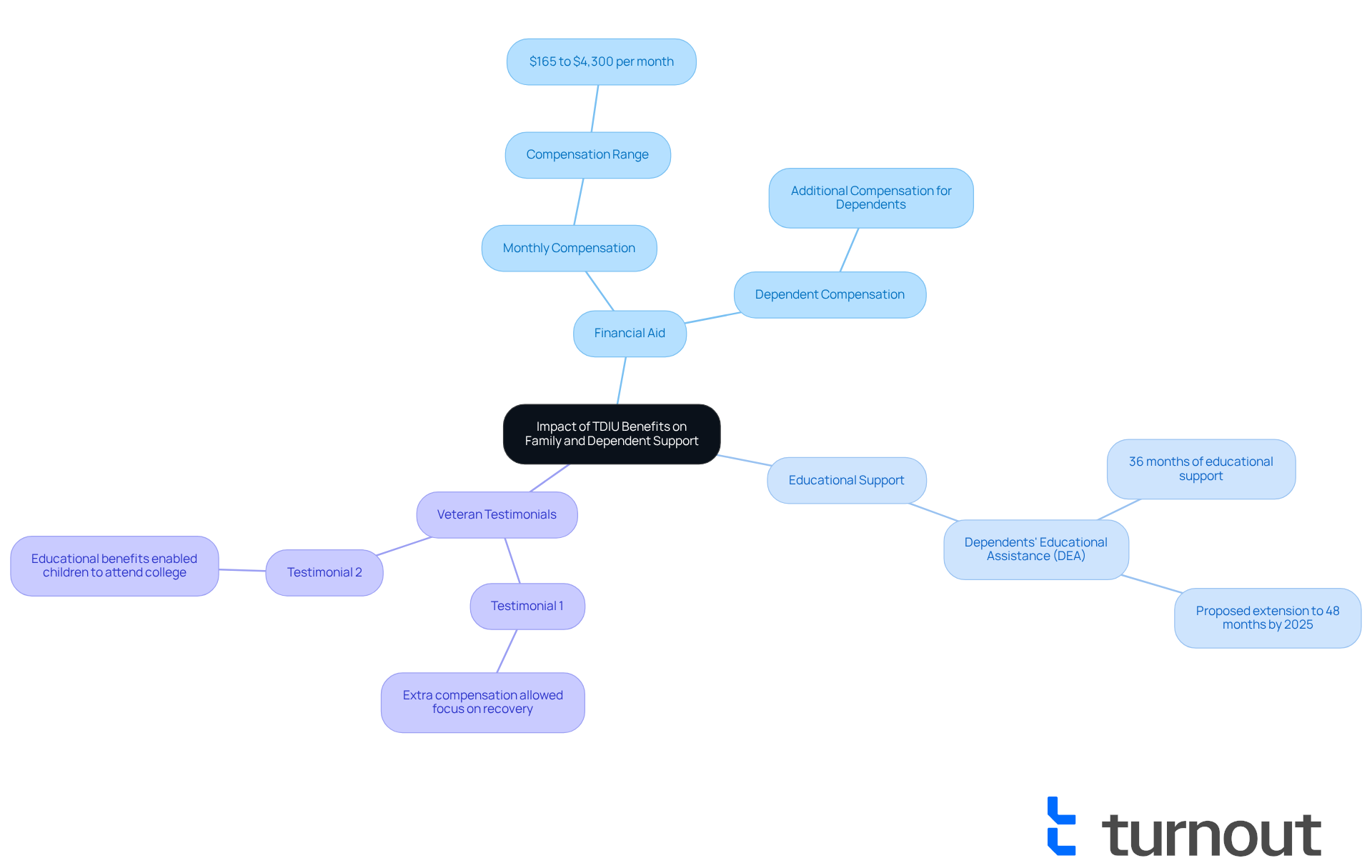
Navigating the Appeals Process for Denied TDIU Claims
If your claim for total disability based on individual unemployability has been rejected, know that you have the right to contest this ruling. It's completely understandable to feel overwhelmed. The appeals process can be a daunting journey, but we're here to guide you through it.
To begin, you will need to submit a Notice of Disagreement (NOD) to the VA, clearly outlining your reasons for the appeal. Gathering additional evidence is crucial. Consider including updated medical documentation and personal statements that reflect your experiences.
Remember, adhering to deadlines and following the VA's procedures for appeals is essential. By doing so, you enhance your chances of a successful outcome. You are not alone in this journey; we are here to support you every step of the way.
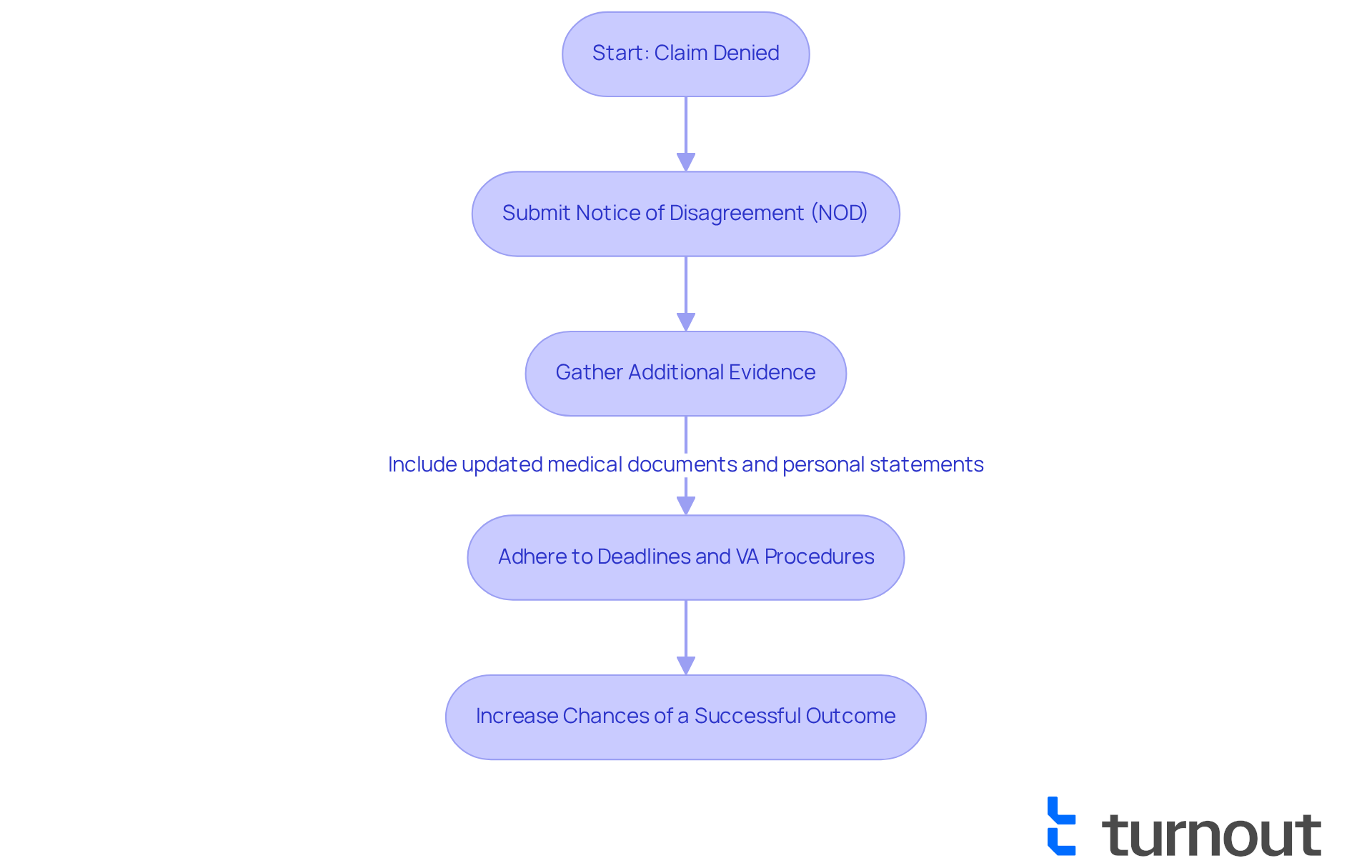
Understanding the Path to Permanent TDIU Benefits
Veterans, we understand that navigating the path to lifelong disability compensation can feel overwhelming. You may be eligible for this support after receiving assistance for a prolonged duration, typically 20 years, or if you are 70 years or older. To secure this permanent status, it’s essential to demonstrate that your service-related disabilities are stable and unlikely to improve.
Achieving lasting total disability status not only offers financial security but also ensures that you can access TDIU benefits, protecting you from potential decreases in support due to changes in your health. Once your total disability rating is deemed permanent, you can breathe easier, knowing you won’t face additional assessments. This reassurance about your entitlements is invaluable.
This designation is crucial for your long-term planning, ensuring consistent support for you and your family. It allows you to focus on your health and well-being without the stress of re-evaluations. If you have received TDIU benefits for 20 consecutive years, rest assured that your benefits cannot be revoked unless fraud is proven. Understanding and pursuing TDIU benefits is vital, and we are here to assist you throughout this journey.
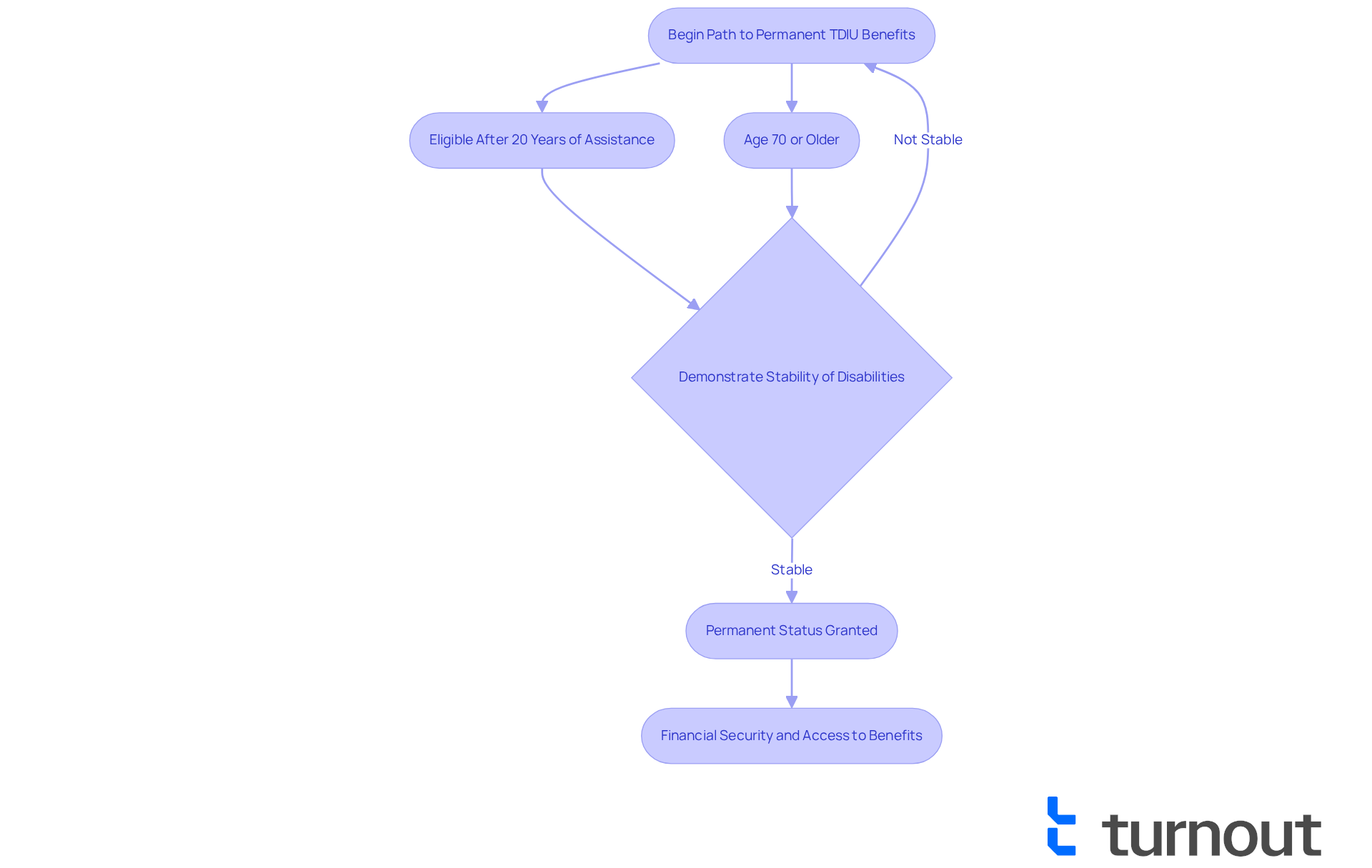
Conclusion
Navigating the complexities of TDIU benefits can feel overwhelming for veterans seeking the support they deserve. We understand that understanding eligibility criteria, application processes, and available resources is essential. With the right guidance and knowledge, veterans can significantly enhance their chances of securing the benefits that provide financial stability and access to essential services.
Key insights highlight the necessity of thorough medical documentation and the importance of completing forms accurately. It’s also crucial to recognize the potential for additional support for dependents. Real-life examples show how veterans have successfully navigated the system, illustrating that while the process may seem daunting, it is not insurmountable. Utilizing resources like Turnout can further simplify this journey, ensuring veterans have the assistance they need at every step.
Ultimately, the path to obtaining TDIU benefits is not just about financial compensation; it’s about reclaiming a sense of independence and security for veterans and their families. By staying informed about eligibility changes and leveraging available support systems, veterans can confidently pursue their claims. Remember, the commitment to understanding and advocating for these benefits is vital for ensuring that those who have served are not left to navigate this journey alone.
Frequently Asked Questions
What is Turnout and how does it assist veterans with TDIU benefit applications?
Turnout is a platform that streamlines the application process for TDIU benefits using AI technology. It simplifies the complexities of the claims process, providing tailored guidance to help veterans understand necessary documentation and eligibility criteria, ultimately enhancing the efficiency of their applications.
Is Turnout a law firm and does it provide legal advice?
No, Turnout is not a law firm and does not provide legal advice. The platform aims to maintain transparency while assisting veterans with their applications.
How does AI technology improve the TDIU application process?
The incorporation of AI technology in Turnout speeds up the application process and ensures veterans receive the necessary support to secure their entitlements, leading to a noticeable decrease in processing times.
What are the eligibility criteria for TDIU benefits?
To qualify for TDIU benefits, veterans must have at least one service-connected condition rated at 60% or higher, or two or more service-connected conditions totaling 70%, with one condition rated at least 40%. They must also demonstrate that their disabilities prevent them from maintaining significantly profitable employment.
Are there any anticipated changes to TDIU eligibility criteria in the future?
Yes, recent changes to disability compensation regulations expected in 2025 aim to streamline the application process and enhance accessibility for veterans. This includes the potential growth of Presumptive Conditions and new age guidelines for individuals with limited employment opportunities.
What financial support do veterans receive from TDIU benefits?
Veterans receiving TDIU benefits can expect monthly payments of $3,831.30 as of 2025, along with additional compensation for dependents. TDIU benefits also provide access to extensive healthcare services and vocational rehabilitation and education assistance.
Can you provide examples of veterans who have benefited from TDIU?
Yes, veterans like Shirley T. and James D. have shared their positive experiences with TDIU benefits. Shirley secured over $104,000 in support during her appeals process, while James achieved a 100% impairment rating after years of struggle, demonstrating the program's transformative impact.
What additional support does TDIU provide beyond financial assistance?
TDIU benefits serve as a vital safety net for veterans unable to maintain meaningful employment due to service-related impairments. This includes access to various programs designed to enhance their quality of life and foster independence.
How can veterans navigate the TDIU application process effectively?
Veterans are encouraged to consult knowledgeable professionals and stay informed about updates from reliable sources to navigate the complexities of the VA system successfully. Turnout is available to assist veterans throughout their journey.




